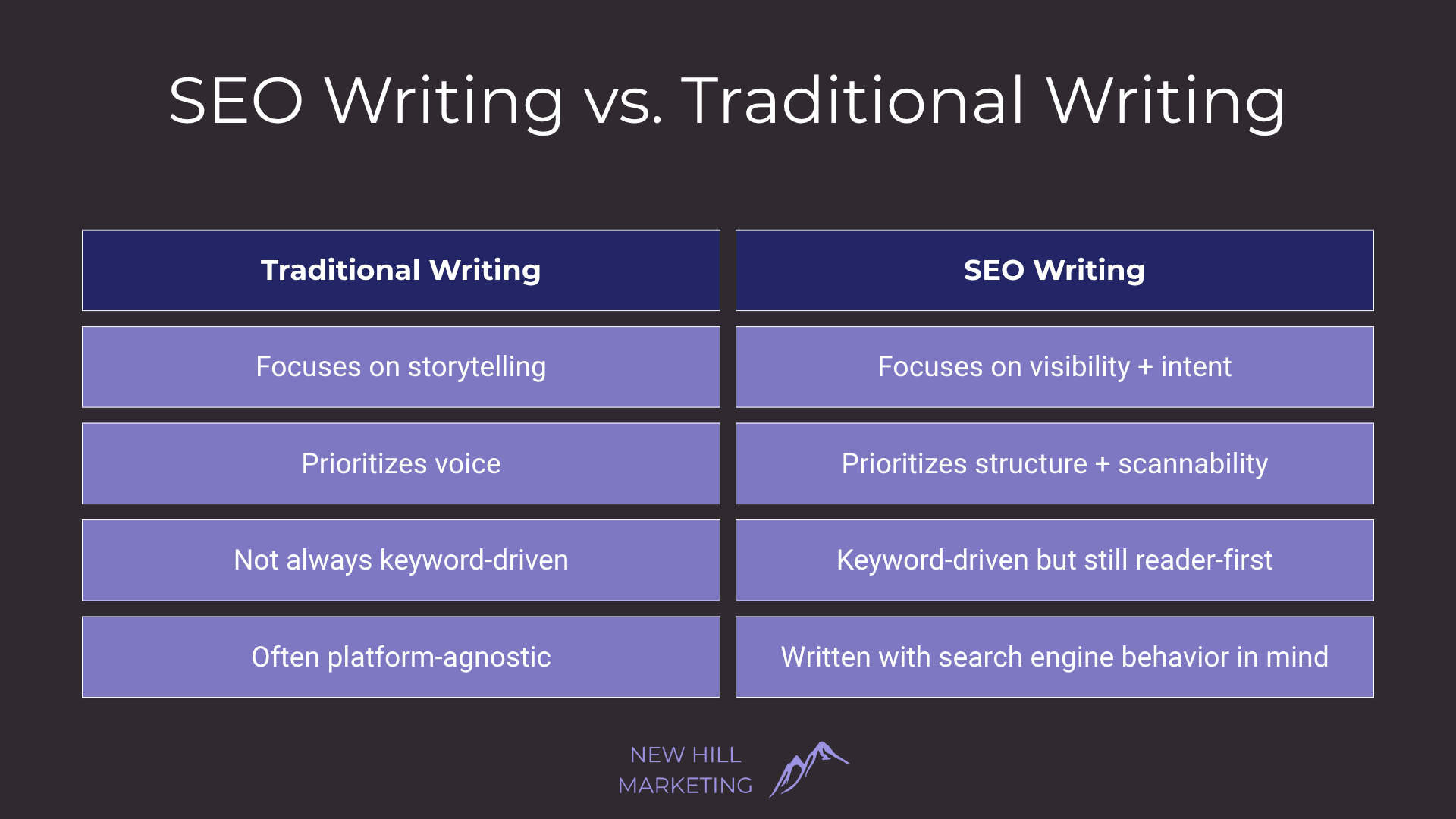SEO Writing: What It Is, Why It Matters, and How to Do It Right
If you've ever wondered how some websites always show up on the first page of Google, you're not alone. The answer often comes down to one powerful tool: SEO writing.
Don’t worry, it’s not as scary or daunting as you might think. Let us break down what SEO writing is, how it works, and why it’s so important (and powerful!) for your business. Whether you're writing blog posts, product pages, or service descriptions, learning to write for both people and search engines can make a major impact.
Key Takeaways
SEO writing means crafting content that ranks in search engines and resonates with real people.
It involves strategic keyword placement, matching search intent, and using semantically related terms.
Good SEO writing includes clear structure, readable formatting, and internal linking to improve user experience and crawlability.
Keyword research is essential; don’t guess what your audience is searching for.
Mobile-friendly formatting and easy-to-skim layouts improve both usability and rankings.
SEO writing applies to more than just blogs: think service pages, product descriptions, location pages, and FAQs.
Stay current by updating old content, following Google’s E-E-A-T guidelines, and avoiding keyword stuffing.
AI tools can support the process, but your voice and expertise still matter.
Avoid common pitfalls like ignoring meta descriptions, poor formatting, or writing only for bots.
Hiring an expert ensures your content is built to rank, connect, and convert.
What Is SEO Writing?
Let’s get right into it. SEO writing (short for search engine optimization writing) is the process of creating content that ranks well in search engine results pages (SERPs). That means writing in a way that both your audience and search engines understand.
You’re not just writing for Google, but you’re definitely writing with Google in mind.
So, what is SEO writing in practical terms? It’s content that:
Uses keywords strategically
Solves user intent
Is clear, well-structured, and informative
Includes internal links, meta tags, and optimized headings
Keeps readers engaged (because that signals value to search engines)
If you're wondering what is SEO content writing, it’s essentially the same thing, just another way of referring to content that’s optimized to be found online.
Why Is SEO Writing Important?
Here’s the real deal: you can have the most helpful, well-written article on the internet, but if no one sees it, it’s not going to help your business.
That’s where SEO writing steps in. Great SEO writing helps:
Drive organic traffic to your site
Increase brand visibility and authority
Build trust with your audience
Generate leads without paid advertising
And perhaps most importantly, it keeps working long after you hit publish.
What Are The Key Elements of Strong SEO Writing
SEO writing isn’t just about cramming in keywords. It’s a thoughtful process that blends user experience, search intent, and smart strategy.
Here are the core elements every piece of SEO writing should include.
Keyword Research
Before you write a word, you need to know what your audience is searching for. Tools like Google Keyword Planner, Semrush, and Ahrefs can help you identify relevant terms and search intent.
Your goal? Find keywords with strong volume and reasonable competition, then create content that answers the questions behind those terms.
Now, you may be tempted to use a generative AI, like ChatGPT, but I wouldn’t recommend this quite yet. I’ve tested using it for keyword research before, and it doesn’t come close to using actual keyword tools. If you can’t afford/don’t want to pay for SEMrush or Ahrefs, Google Keyword Planner is free after you set up your ads account (just remember to turn your ads off after setting up the initial campaign so you’re not charged)
Search Intent Matching
Not all keywords are created equal. Some indicate someone is looking for information ("what is seo content writing"), while others signal they're ready to buy ("best seo writing service").
Make sure your content matches the intent behind the search, not just the words.
On-Page Optimization
Good SEO writing isn’t just about picking keywords; it’s about using them strategically. Here’s how:
Place your target keyword in key areas: Add it to the page title, meta description, URL, and the first paragraph to clearly signal your topic.
Use semantically related terms: Sprinkle in naturally related words to give search engines more context and improve topic relevance.
Structure with H2s and H3s: Organized headings make your content easier to skim and help search engines understand its layout.
Include internal links: Link to other relevant pages or blog posts to support navigation, keep users engaged, and boost crawlability.
Write descriptive alt text for images: This improves accessibility and gives search engines more content to work with, just keep it relevant and clear.
Readability
Don’t forget: your content has to be good. That’s why you shouldn’t just rely on AI outputs for your SEO writing. It’s important to be impactful with your content.
That means:
Short paragraphs
Clear sentences
Bullet points where helpful
No jargon unless it’s explained
A tone that fits your brand
SEO may get someone to your site, but strong writing keeps them there.
Mobile and UX-Friendly Formatting
More than half of users search on their phones, so your content should be mobile-friendly. Use headers, avoid huge blocks of text, and test how it looks on different devices.
Common Types of SEO Content
SEO writing isn’t just about blog posts (though those are great). Here are other types of content that benefit from SEO strategy:
Service pages: Make sure your core offerings show up in search.
Product descriptions: Help people find and buy your products.
Location pages: Rank in local searches with pages focused on city or region-based queries.
FAQs: Great for answering common questions and targeting long-tail keywords.
Case studies and testimonials: These can show up in branded or comparison searches.
Best Practices for SEO Writing in 2025
Search engines are constantly evolving, and so are best practices. That’s why we recommend working with an SEO professional, like New Hill Marketing, so you don’t have to worry about staying up to date with the constant changes.
Here’s what works now.
Prioritize Helpful, High-Quality Content
Google’s Helpful Content updates and E-E-A-T guidelines (Experience, Expertise, Authoritativeness, and Trustworthiness) mean your content needs to be genuinely valuable. Ask yourself: “Would someone come back to this?”
Use AI (But Don’t Rely On It)
AI tools can support keyword research and structure, but your voice and perspective still matter. Google's algorithms are getting better at detecting quality and originality.
While AI is getting introduced into our daily life more often, it’s important to remember we’re writing seo content for people first. Sure, we want Google to rank our content, but we want people to resonate with it.
Refresh Old Content
Updating old posts with new stats, better formatting, and improved SEO can give them a second life. Take this blog for example. We originally published it years ago, but gave it a much-needed facelift so it’s actually helpful today!
Don’t Overdo Keywords
Keyword stuffing will hurt more than help. Use your focus keyword naturally, and support it with related terms and real context.
Examples of SEO Writing in Action
Let’s say you're targeting the keyword “SEO writing tips.” A strong blog post might include:
A definition of SEO writing
Examples of what good SEO content looks like
A list of tools to help writers optimize their work
A step-by-step guide to creating an optimized blog post
Internal links to your service pages or related resources
Each section serves a purpose and helps search engines and readers understand what the page is about.
Mistakes to Avoid in SEO Writing
Even with the best intentions, these missteps can hold your content back:
Writing for bots, not people: Prioritize humans. Always.
Skipping keyword research: Don’t guess what your audience wants, know it.
Neglecting formatting: Walls of text scare people away.
Forgetting meta descriptions: These snippets can make or break your click-through rate.
Publishing and ghosting: Promote your content across channels, and track performance.
SEO Writing vs. Traditional Writing
Here’s the difference in a nutshell:
They aren’t mutually exclusive, but if you want to get found, SEO writing is a skill you’ll need to sharpen.
Should You DIY Your SEO Writing?
If you’ve got the time, tools, and strategy, absolutely. But for many businesses, outsourcing is the smarter path.
Hiring an expert ensures:
Your content aligns with your business goals
You’re using keywords that matter
Your pages are built to not just rank, but convert, too
You stay ahead of algorithm changes and best practices
SEO Writing Is About Connection, Not Just Clicks
Great SEO writing isn't just about climbing search rankings. It’s about meeting your audience where they are, answering their questions, and building trust one click at a time.
At New Hill Marketing, we specialize in SEO writing that’s strategic, readable, and results-driven. Whether you need website copy, service pages, or blog content that ranks and resonates, we’re here to help.
Ready to Reach More Customers Through SEO Writing?
Let’s make your content work harder. Reach out to New Hill Marketing today and get SEO writing that’s built to grow your business, one word at a time.




